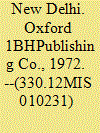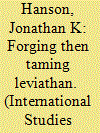| Srl | Item |
| 1 |
ID:
026186


|
|
|
1972

|
|
|
|
| Publication |
New Delhi, Oxford 1BHPublishing Co., 1972.
|
| Description |
xxi,272p
|
|
|
|
|
|
|
|
|
|
|
|
Copies: C:1/I:0,R:0,Q:0
Circulation
| Accession# | Call# | Current Location | Status | Policy | Location |
| 010231 | 330.12MIS/010231 | Main | On Shelf | General | |
|
|
|
|
| 2 |
ID:
151411


|
|
|
|
|
| Summary/Abstract |
China’s economic success derives from the co-evolution of the political and economic systems. There is no single ‘China model’. Rather, three successive generations of China model can be identified, corresponding to ‘growth equilibria’ that emerged when policy responded effectively to specific economic challenges. The structure of interaction between economic and political is determined by the basic governance strategy of the Chinese Communist Party.
|
|
|
|
|
|
|
|
|
|
|
|
|
|
|
|
| 3 |
ID:
133653


|
|
|
|
|
| Publication |
2014.
|
| Summary/Abstract |
Empirical research in the New Institutional Economics tradition has concentrated on the degree to which institutional constraints on rulers protect property rights and foster growth through private investment. This view of institutions is overly narrow, neglecting the role of state capacity in particular. Both state authority and constraints on rulers matter for economic performance, but the relative strength of these effects depends upon a country's distance from the frontier of the world economy. Tests using a panel data set that covers up to 84 countries from the period 1960 to 2005 reveal that, in countries that have low Gross Domestic Product (GDP) per capita, constraints on rulers in the form of checks and balances affect neither the rate of productivity growth nor the growth of capital stock per worker. Basic state authority, however, has a strong, positive effect on both of these outcomes. The story is different for advanced industrial economies, where the effects of checks are positive, especially with respect to productivity growth. Institutional checks on rulers are thus not an agent of investment-based growth but support continued growth based upon innovation at the leading edge.
|
|
|
|
|
|
|
|
|
|
|
|
|
|
|
|